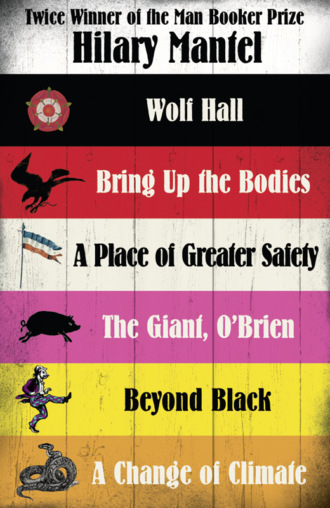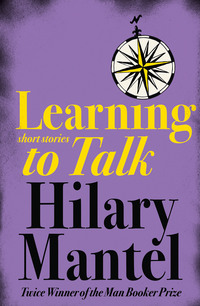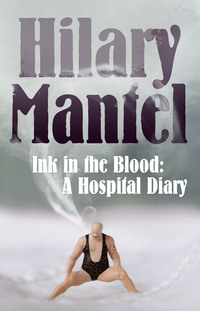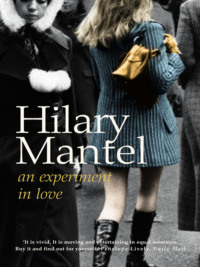
Полная версия
Hilary Mantel Collection: Six of Her Best Novels
‘Asleep?’ Liz says.
‘No. But dreaming.’
‘The Castile soap came. And your book from Germany. It was packaged as something else. I almost sent the boy away.’
In Yorkshire, which smelled of unwashed men, wearing sheepskins and sweating with anger, he had dreams about the Castile soap.
Later she says, ‘So who is the lady?’
His hand, resting on her familiar but lovely left breast, removes itself in bewilderment. ‘What?’ Does she think he has taken up with some woman in Yorkshire? He falls on to his back and wonders how to persuade her this is not so; if necessary he'll take her there, and then she'll see.
‘The emerald lady?’ she says. ‘I only ask because people say the king is wanting to do something very strange, and I can't really believe it. But that is the word in the city.’
Really? Rumour has advanced, in the fortnight while he has been north among the slope-heads.
‘If he tries this,’ she says, ‘then half the people in the world will be against it.’
He had only thought, and Wolsey had only thought, that the Emperor and Spain would be against it. Only the Emperor. He smiles in the dark, hands behind his head. He doesn't say, which people, but waits for Liz to tell him. ‘All women,’ she says. ‘All women everywhere in England. All women who have a daughter but no son. All women who have lost a child. All women who have lost any hope of having a child. All women who are forty.’
She puts her head on his shoulder. Too tired to speak, they lie side by side, in sheets of fine linen, under a quilt of yellow turkey satin. Their bodies breathe out the faint borrowed scent of sun and herbs. In Castilian, he remembers, he can insult people.
‘Are you asleep now?’
‘No. Thinking.’
‘Thomas,’ she says, sounding shocked, ‘it's three o'clock.’
And then it is six. He dreams that all the women of England are in bed, jostling and pushing him out of it. So he gets up, to read his German book, before Liz can do anything about it.
It's not that she says anything; or only, when provoked, she says, ‘My prayer book is good reading for me.’ And indeed she does read her prayer book, taking it in her hand absently in the middle of the day – but only half stopping what she's doing – interspersing her murmured litany with household instructions; it was a wedding present, a book of hours, from her first husband, and he wrote her new married name in it, Elizabeth Williams. Sometimes, feeling jealous, he would like to write other things, contrarian sentiments: he knew Liz's first husband, but that doesn't mean he liked him. He has said, Liz, there's Tyndale's book, his New Testament, in the locked chest there, read it, here's the key; she says, you read it to me if you're so keen, and he says, it's in English, read it for yourself: that's the point, Lizzie. You read it, you'll be surprised what's not in it.
He'd thought this hint would draw her: seemingly not. He can't imagine himself reading to his household; he's not, like Thomas More, some sort of failed priest, a frustrated preacher. He never sees More – a star in another firmament, who acknowledges him with a grim nod – without wanting to ask him, what's wrong with you? Or what's wrong with me? Why does everything you know, and everything you've learned, confirm you in what you believed before? Whereas in my case, what I grew up with, and what I thought I believed, is chipped away a little and a little, a fragment then a piece and then a piece more. With every month that passes, the corners are knocked off the certainties of this world: and the next world too. Show me where it says, in the Bible, ‘Purgatory’. Show me where it says relics, monks, nuns. Show me where it says ‘Pope’.
He turns back to his German book. The king, with help from Thomas More, has written a book against Luther, for which the Pope has granted him the title of Defender of the Faith. It's not that he loves Brother Martin himself; he and the cardinal agree it would be better if Luther had never been born, or better if he had been born more subtle. Still, he keeps up with what's written, with what's smuggled through the Channel ports, and the little East Anglian inlets, the tidal creeks where a small boat with dubious cargo can be beached and pushed out again, by moonlight, to sea. He keeps the cardinal informed, so that when More and his clerical friends storm in, breathing hellfire about the newest heresy, the cardinal can make calming gestures, and say, ‘Gentlemen, I am already informed.’ Wolsey will burn books, but not men. He did so, only last October, at St Paul's Cross: a holocaust of the English language, and so much rag-rich paper consumed, and so much black printers' ink.
The Testament he keeps in the chest is the pirated edition from Antwerp, which is easier to get hold of than the proper German printing. He knows William Tyndale; before London got too hot for him, he lodged six months with Humphrey Monmouth, the master draper, in the city. He is a principled man, a hard man, and Thomas More calls him The Beast; he looks as if he has never laughed in his life, but then, what's there to laugh about, when you're driven from your native shore? His Testament is in octavo, nasty cheap paper: on the title page, where the printer's colophon and address should be, the words ‘PRINTED IN UTOPIA’. He hopes Thomas More has seen one of these. He is tempted to show him, just to see his face.
He closes the new book. It's time to get on with the day. He knows he has not time to put the text into Latin himself, so it can be discreetly circulated; he should ask somebody to do it for him, for love or money. It is surprising how much love there is, these days, between those who read German.
By seven, he is shaved, breakfasted and wrapped beautifully in fresh unborrowed linen and dark fine wool. Sometimes, at this hour, he misses Liz's father; that good old man, who would always be up early, ready to drop a flat hand on his head and say, enjoy your day, Thomas, on my behalf.
He had liked old Wykys. He first came to him on a legal matter. In those days he was – what, twenty-six, twenty-seven? – not long back from abroad, prone to start a sentence in one language and finish it in another. Wykys had been shrewd and had made a tidy fortune in the wool trade. He was a Putney man originally, but that wasn't why he employed him; it was because he came recommended and came cheap. At their first conference, as Wykys laid out the papers, he had said, ‘You're Walter's lad, aren't you? So what happened? Because, by God, there was no one rougher than you were when you were a boy.’
He would have explained, if he'd known what sort of explanation Wykys would understand. I gave up fighting because, when I lived in Florence, I looked at frescoes every day? He said, ‘I found an easier way to be.’
Latterly, Wykys had grown tired, let the business slide. He was still sending broadcloth to the north German market, when – in his opinion, with wool so long in the fleece these days, and good broadcloth hard to weave – he ought to be getting into kerseys, lighter cloth like that, exporting through Antwerp to Italy. But he listened – he was a good listener – to the old man's gripes, and said, ‘Things are changing. Let me take you to the cloth fairs this year.’
Wykys knew he should show his face in Antwerp and Bergen op Zoom, but he didn't like the crossing. ‘He'll be all right with me,’ he told Mistress Wykys. ‘I know a good family where we can stay.’
‘Right, Thomas Cromwell,’ she said. ‘Make a note of this. No strange Dutch drinks. No women. No banned preachers in cellars. I know what you do.’
‘I don't know if I can stay out of cellars.’
‘Here's a bargain. You can take him to a sermon if you don't take him to a brothel.’
Mercy, he suspects, comes from a family where John Wycliffe's writings are preserved and quoted, where the scriptures in English have always been known; scraps of writing hoarded, forbidden verses locked in the head. These things come down the generations, as eyes and noses come down, as meekness or the capacity for passion, as muscle power or the need to take a risk. If you must take risks these days, better the preacher than the whore; eschew Monsieur Breakbone, known in Florence as the Neapolitan Fever, and in Naples, no doubt, as Florence Rot. Good sense enforces abstinence – in any part of Europe, these islands included. Our lives are limited in this way, as the lives of our forefathers were not.
On the boat, he listened to the usual grievances from fellow passengers: these bastard pilots, lanes not marked, English monopolies. The merchants of the Hanse would rather their own men brought the ships up to Gravesend: Germans are a pack of thieves, but they know how to bring a boat upstream. Old Wykys was queasy when they put out to sea. He stayed on deck, making himself useful; you must have been a ship's boy, master, one of the crew said. Once in Antwerp, they made their way to the sign of the Holy Ghost. The servant opening the door shouted ‘It's Thomas come back to us,’ as if he'd risen from the dead. When the three old men came out, the three brothers from the boat, they clucked, ‘Thomas, our poor foundling, our runaway, our little beaten-up friend. Welcome, come in and get warm!’
Nowhere else but here is he still a runaway, still a little, beaten boy.
Their wives, their daughters, their dogs covered him in kisses. He left old Wykys by the fireside – it is surprising how international is the language of old men, swapping tips on salves for aches, commiserating with petty wretchednesses and discussing the whims and demands of their wives. The youngest brother would translate, as usual: straight-faced, even when the terms became anatomical.
He had gone out drinking with the three brothers' three sons. ‘Wat will je?’ they teased him. ‘The old man's business? His wife when he dies?’
‘No,’ he said, surprising himself. ‘I think I want his daughter.’
‘Young?’
‘A widow. Young enough.’
When he got back to London he knew he could turn the business around. Still, he needed to think of the day-to-day. ‘I've seen your stock,’ he said to Wykys. ‘I've seen your accounts. Now show me your clerks.’
That was the key, of course, the key that would unlock profit. People are always the key, and if you can look them in the face you can be pretty sure if they're honest and up to the job. He tossed out the dubious chief clerk – saying, you go, or we go to law – and replaced him with a stammering junior, a boy he'd been told was stupid. Timid, was all he was; he looked over his work each night, mildly and wordlessly indicating each error and omission, and in four weeks the boy was both competent and keen, and had taken to following him about like a puppy. Four weeks invested, and a few days down at the docks, checking who was on the take: by the year end, Wykys was back in profit.
Wykys stumped away after he showed him the figures. ‘Lizzie?’ he yelled. ‘Lizzie? Come downstairs.’
She came down.
‘You want a new husband. Will he do?’
She stood and looked him up and down. ‘Well, Father. You didn't pick him for his looks.’ To him, her eyebrows raised, she said, ‘Do you want a wife?’
‘Should I leave you to talk it over?’ old Wykys said. He seemed baffled: seemed to think they should sit down and write a contract there and then.
Almost, they did. Lizzie wanted children; he wanted a wife with city contacts and some money behind her. They were married in weeks. Gregory arrived within the year. Bawling, strong, one hour old, plucked from the cradle: he kissed the infant's fluffy skull and said, I shall be as tender to you as my father was not to me. For what's the point of breeding children, if each generation does not improve on what went before?
So this morning – waking early, brooding on what Liz said last night – he wonders, why should my wife worry about women who have no sons? Possibly it's something women do: spend time imagining what it's like to be each other.
One can learn from that, he thinks.
It's eight o'clock. Lizzie is down. Her hair is pushed under a linen cap and her sleeves turned back. ‘Oh, Liz,’ he says, laughing at her. ‘You look like a baker's wife.’
‘You mind your manners,’ she says. ‘Pot-boy.’
Rafe comes in: ‘First back to my lord cardinal?’ Where else, he says. He gathers his papers for the day. Pats his wife, kisses his dog. Goes out. The morning is drizzly but brightening, and before they reach York Place it is clear the cardinal has been as good as his word. A wash of sunlight lies over the river, pale as the flesh of a lemon.
Конец ознакомительного фрагмента.
Текст предоставлен ООО «ЛитРес».
Прочитайте эту книгу целиком, купив полную легальную версию на ЛитРес.
Безопасно оплатить книгу можно банковской картой Visa, MasterCard, Maestro, со счета мобильного телефона, с платежного терминала, в салоне МТС или Связной, через PayPal, WebMoney, Яндекс.Деньги, QIWI Кошелек, бонусными картами или другим удобным Вам способом.








